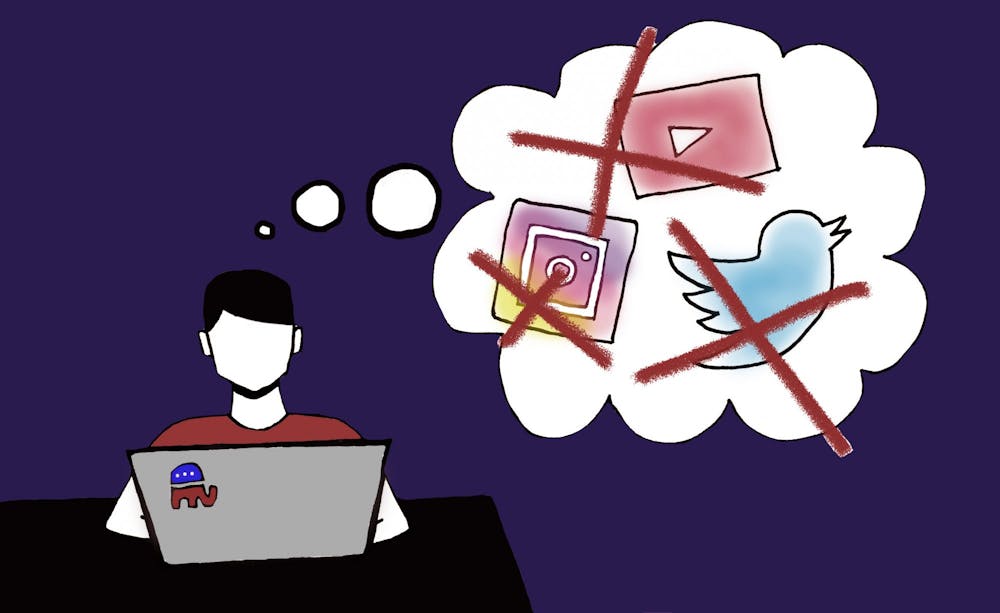“Cancel culture” is likely the most uttered phrase by right-wing social media personalities like Ben Shapiro. Any time a notable conservative is criticized, Republican lawmakers and commentators blame cancel culture, a modern phenomenon where someone is punished for doing or saying something controversial.
The phrase, which started out as a misogynistic joke according to Vox, has been in the popular lexicon since around 2015 but has seen renewed attention in recent months after actress Gina Carano and U.S. Rep. Marjorie Taylor Greene, R-Ga., were both allegedly “canceled” because of their offensive social media posts.
But cancel culture doesn’t exist. There is no organized oppression of right-wing views in this country.
Carano was fired from the Disney+ show “The Mandalorian” for repeatedly posting abhorrent statements on social media, including comparing being a conservative today to being Jewish during the Holocaust, mocking pronouns in her Twitter bio, protesting the use of face masks and questioning the results of the 2020 presidential election.
There should be no doubt among liberals and conservatives alike that these are fireable offenses, not to mention viewpoints Disney would prefer to distance itself from. Yet conservatives online have cried “cancel culture!” all the same.
There are always going to be opinions more popular than others during a given period of time. In the 1990s and early 2000s, for example, conservative social views were more dominant in the U.S. We can see this in the removal of Harry Potter books from some schools and libraries — and sometimes subsequent burning — by religious groups because of references to “witchcraft.”
Now, progressive social views are more popular than conservative ones. This is a good thing — as the world changes, so too should our perspectives.
Here we find what “cancel culture” actually is — a way to play the victim. When your views about society are regressive, it’s far easier to pretend you’re being persecuted than to introspect. Were your views founded on ideas that fragile? Have you really not updated your worldview in decades?
Additionally, crying that you’ve been canceled has proved to be a phenomenal career move in many ways. Carano turned her firing into a movie deal with the conservative publication The Daily Wire. Louis C.K., the comedian who was “canceled” after allegations of sexual harassment arose in 2017, went back to touring in 2018 to sold-out shows. Being “canceled” gives stars increased publicity and reinforces the idea that conservatives are being persecuted.
Carano should’ve been fired for saying those things. “Cancel culture” was not a factor. Greene’s removal from her congressional committees after old social media posts threatening the lives of prominent politicians resurfaced was similarly justified.
The First Amendment, which guarantees, among other things, freedom of speech, is often invoked by those on the right in these cases. But the First Amendment only protects against Congress restricting freedom of speech in certain situations. You can still be fired, ostracized or suspended by Twitter or any other private entity.
Those on the right aren’t being canceled. People just generally don’t like them.
As for the radicals who have been fired or removed for saying terrible things, are those the people the right really wants representing conservatism? I’ve never seen someone “canceled” that didn’t do or say something horrible.
It probably doesn’t bode well for conservative messaging when you constantly have to defend terrible people. It seems to equate being a problematic person with being conservative itself.
Interestingly, many people targeted by “cancel culture” are not conservatives at all. People are ostracized when they do or say something bigoted. It usually has nothing to do with politics. This past year, the most high-profile “cancellations” were Ellen DeGeneres — slammed with allegations of harsh treatment of her staff — and J.K. Rowling, who doubled down on her own previous transphobic statements. The two are extremely famous liberals, not very progressive by most standards, but liberal nonetheless.
It’s almost like “cancel culture” is a term that has no real meaning beyond “my actions have consequences and I’m mad about it.”
So please, I never want to hear about “cancel culture” again.
Noah Moore (he/him) is a sophomore studying psychology, theater, international studies and French. He is a Wells Scholar, representative in Student Body Congress and member of the Singing Hoosiers. Noah enjoys listening to music and hiking around Lake Monroe.






